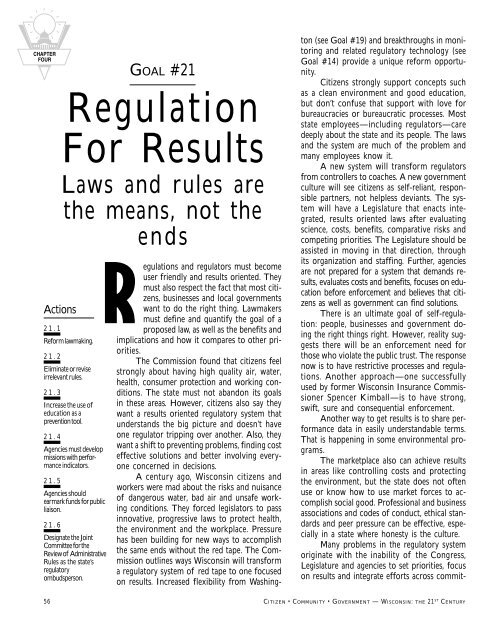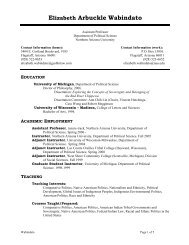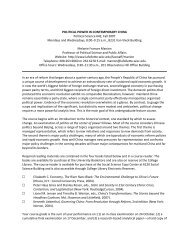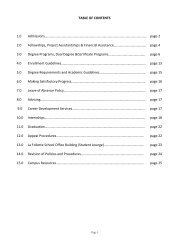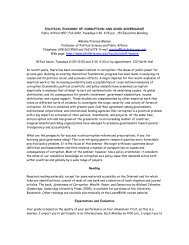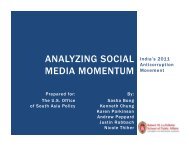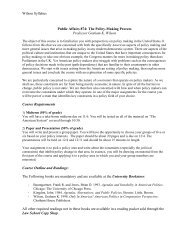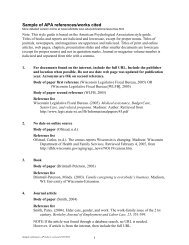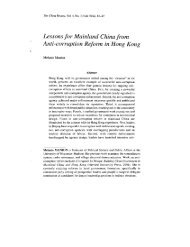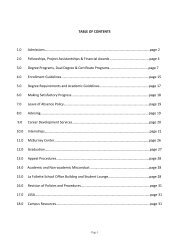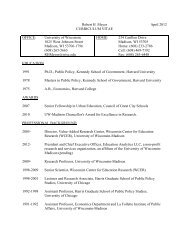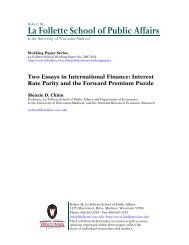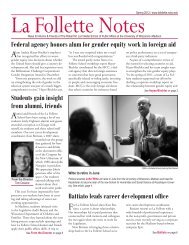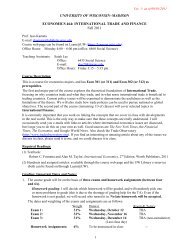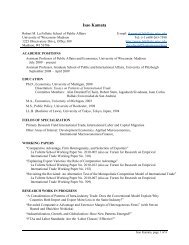SAVE Commission's findings - La Follette School of Public Affairs ...
SAVE Commission's findings - La Follette School of Public Affairs ...
SAVE Commission's findings - La Follette School of Public Affairs ...
Create successful ePaper yourself
Turn your PDF publications into a flip-book with our unique Google optimized e-Paper software.
CHAPTER<br />
FOUR<br />
GOAL #21<br />
Regulation<br />
For Results<br />
<strong>La</strong>ws and rules are<br />
the means, not the<br />
ends<br />
Actions<br />
21.1<br />
Reform lawmaking.<br />
21.2<br />
Eliminate or revise<br />
irrelevant rules.<br />
21.3<br />
Increase the use <strong>of</strong><br />
education as a<br />
prevention tool.<br />
21.4<br />
Agencies must develop<br />
missions with performance<br />
indicators.<br />
21.5<br />
Agencies should<br />
earmark funds for public<br />
liaison.<br />
21.6<br />
Designate the Joint<br />
Committee for the<br />
Review <strong>of</strong> Administrative<br />
Rules as the state’s<br />
regulatory<br />
ombudsperson.<br />
egulations and regulators must become<br />
user friendly and results oriented. They<br />
must also respect the fact that most citizens,<br />
businesses and local governments<br />
want to do the right thing. <strong>La</strong>wmakers<br />
must define and quantify the goal <strong>of</strong> a<br />
proposed law, as well as the benefits and<br />
implications and how it compares to other priorities.<br />
The Commission found that citizens feel<br />
strongly about having high quality air, water,<br />
health, consumer protection and working conditions.<br />
The state must not abandon its goals<br />
in these areas. However, citizens also say they<br />
want a results oriented regulatory system that<br />
understands the big picture and doesn’t have<br />
one regulator tripping over another. Also, they<br />
want a shift to preventing problems, finding cost<br />
effective solutions and better involving everyone<br />
concerned in decisions.<br />
A century ago, Wisconsin citizens and<br />
workers were mad about the risks and nuisance<br />
<strong>of</strong> dangerous water, bad air and unsafe working<br />
conditions. They forced legislators to pass<br />
innovative, progressive laws to protect health,<br />
the environment and the workplace. Pressure<br />
has been building for new ways to accomplish<br />
the same ends without the red tape. The Commission<br />
outlines ways Wisconsin will transform<br />
a regulatory system <strong>of</strong> red tape to one focused<br />
on results. Increased flexibility from Washing-<br />
ton (see Goal #19) and breakthroughs in monitoring<br />
and related regulatory technology (see<br />
Goal #14) provide a unique reform opportunity.<br />
Citizens strongly support concepts such<br />
as a clean environment and good education,<br />
but don’t confuse that support with love for<br />
bureaucracies or bureaucratic processes. Most<br />
state employees—including regulators—care<br />
deeply about the state and its people. The laws<br />
and the system are much <strong>of</strong> the problem and<br />
many employees know it.<br />
A new system will transform regulators<br />
from controllers to coaches. A new government<br />
culture will see citizens as self-reliant, responsible<br />
partners, not helpless deviants. The system<br />
will have a Legislature that enacts integrated,<br />
results oriented laws after evaluating<br />
science, costs, benefits, comparative risks and<br />
competing priorities. The Legislature should be<br />
assisted in moving in that direction, through<br />
its organization and staffing. Further, agencies<br />
are not prepared for a system that demands results,<br />
evaluates costs and benefits, focuses on education<br />
before enforcement and believes that citizens<br />
as well as government can find solutions.<br />
There is an ultimate goal <strong>of</strong> self-regulation:<br />
people, businesses and government doing<br />
the right things right. However, reality suggests<br />
there will be an enforcement need for<br />
those who violate the public trust. The response<br />
now is to have restrictive processes and regulations.<br />
Another approach—one successfully<br />
used by former Wisconsin Insurance Commissioner<br />
Spencer Kimball—is to have strong,<br />
swift, sure and consequential enforcement.<br />
Another way to get results is to share performance<br />
data in easily understandable terms.<br />
That is happening in some environmental programs.<br />
The marketplace also can achieve results<br />
in areas like controlling costs and protecting<br />
the environment, but the state does not <strong>of</strong>ten<br />
use or know how to use market forces to accomplish<br />
social good. Pr<strong>of</strong>essional and business<br />
associations and codes <strong>of</strong> conduct, ethical standards<br />
and peer pressure can be effective, especially<br />
in a state where honesty is the culture.<br />
Many problems in the regulatory system<br />
originate with the inability <strong>of</strong> the Congress,<br />
Legislature and agencies to set priorities, focus<br />
on results and integrate efforts across commit-<br />
56 CITIZEN • COMMUNITY • GOVERNMENT — WISCONSIN: THE 21 ST CENTURY


